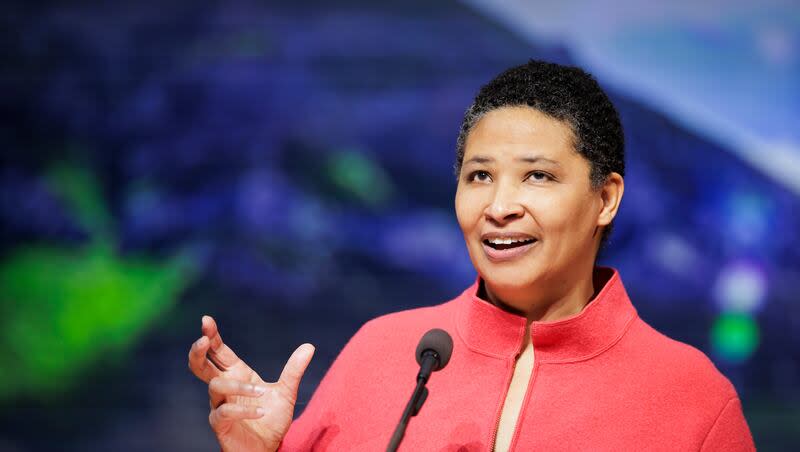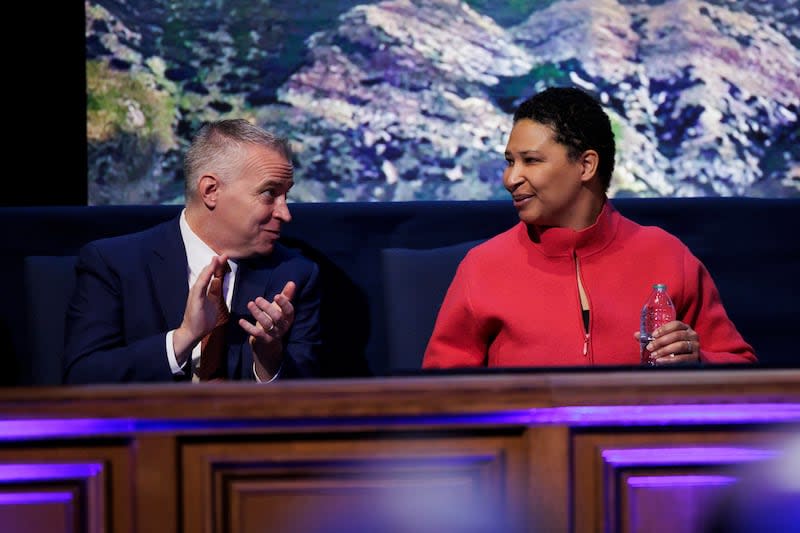Five steps to becoming a confident pluralist, according to Harvard prof. Danielle Allen in BYU Forum

- Oops!Something went wrong.Please try again later.
Pluralism and constitutional democracy operates best when people hold human dignity sacred even when there are disagreements. That was the center of Harvard public policy and political philosophy professor Danielle Allen’s remarks on “How to Be a Confident Pluralist” delivered Tuesday to thousands of BYU students and faculty members.
Allen, director of the Allen Lab for Democracy Renovation at the Harvard Kennedy School’s Ash Center, said commitment to democracy and civic engagement is part of her family heritage. Her grandfather founded one of the first NAACP chapters in northern Florida and her maternal great grandparents marched for women’s suffrage.
Part of this “ancestral commitment” manifested itself over the dinner table when Allen was growing up. She recalled a time when her dad and her aunt were both on the ballot. Her dad, a Reagan Republican, would intellectually spar with her aunt, who was part of the Peace and Freedom Party.
These conversations didn’t lead to personal jabs or contention, Allen said. “For all that they were debating, they actually shared a common purpose. The purpose they shared was this idea that empowerment for a person, for their family, for the community was at the bedrock of human thriving.”
As Allen put it, her dad and aunt “never broke the bonds of love” and “held sacred the dignity of the human being in front of them.”
A gift of freedom, Allen explained, is that individuals have different ideas of what qualifies as good. “James Madison wrote this in the Federalist Papers, that one of the most important results of freedom is diversity, that when people are free to dig deep and think about what matters to them and why,” she said. This then facilitates making “decisions together.”
Allen laid out five steps to becoming a confident pluralist.
Five steps to becoming a confident pluralist
Reflection. Drawing on her background as a classicist, Allen stipulated that at the heart of reflection is the question Socrates asked: how should we live?
“It requires the work of philosophy, it requires theology, it requires literature to dig into the question of what matters to human beings and why and what is the good life after all,” Allen said. These kinds of questions need to be part of our daily life.
Commitment to institutions and negotiation. The principle of nonviolence is critical to maintaining commitment to institutions and negotiations, Allen said. Citing violence across the country, she said, “They’re forgetting that the project of free self-government requires seeing that institutions are the instruments that we use for negotiating our conflicts and our differences.”
Allen said this is when unity can flourish.

Commitment to compromise. Compromise doesn’t mean relinquishing core principles. Allen said the deeper meaning of compromise can be found in the second sentence of the Declaration of Independence.
“We hold these truths to be self-evident, that all men are created equal, that they are endowed by their Creator with certain unalienable Rights, that among these are Life, Liberty and the pursuit of Happiness,” the document reads. It continues by saying people have the right to alter government in order to effectuate these rights.
Allen cited John Adams as leading the charge on what she referred to as a good example of compromise.
Adams, an abolitionist, made the case that instead of enshrining “life, liberty and property” into the Declaration of Independence, the Founding Fathers instead use the phrase “the pursuit of happiness.” This was because the word “property” was connected to enslavement.
“Indeed, Adams built on that language to help end enslavement in Massachusetts before the end of the Revolutionary War,” Allen said.
There was a second compromise around this time that Allen called a bad compromise. When drafting a passage criticizing King George for “violating the sacred rights of life and liberty of distant people in Africa,” they used the same language they used for themselves. But Congress edited the passage “to cut out a statement that positively affirmed the rights of people in Africa.”
Allen said it’s important to pay attention to the difference between these two compromises. In one compromise, the people affected by it had their voices heard — that’s the good compromise. In the other, those impacted by it were not part of the decision.
“When making those compromises, a confident pluralist wants to make sure that everybody who might be affected by the decision has a voice in the process,” Allen said.
Commitment to listening and mirroring back before speaking. In the work of negotiating, Allen said “we have to prioritize listening.” To improve dialogue, she suggested that after hearing someone lay out their argument, instead of immediately responding to it, you repeat back what you think they said and ask them if they feel like you understood.
“You’ll find nine times out of 10, they’ll say no,” Allen said. “...The debate really shouldn’t get started until both sides can tell each other what they think each other thinks and have each side agree that, yes, you understood me correctly.”
When this happens, Allen said you’ll find that you stand on more common ground than you thought you did.
To never let anybody hold hostage human dignity. The fifth and final step to becoming a confident pluralist relates a lot to the fourth, Allen said. It’s to never hold human dignity hostage.
Allen said she gets an influx of negative emails. One came from an individual who she called Mr. Smith. “Aren’t you ashamed to be associated with an institution that supports anti-Semitism and terrorism? I don’t know how you can sleep at night. You are a despicable human being,” the email said.
Replying to the email, Allen said she sent along a column she wrote for The Washington Post and asked kindly if he read it. The next email she received from Mr. Smith contained an apology and the admission “sometimes one should spend more time thinking and taking a deep breath before lashing out at someone.”
Allen said her decision to reply with kindness to negative emails like the one she received from Mr. Smith grew out of the realization that she was allowing the negativity to impact her. “So, I decided that every time I received a negative message, I would meet it with the most open, welcoming, warm spirit I possibly could.”
In turn, she said, she recognized that the antidote to anyone holding human dignity hostage is “meeting that always with love and generosity.”


